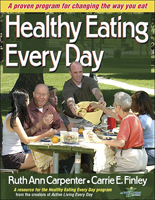 |
Healthy
Eating Every Day,
Ruth Ann Carpenter and Carrie E. Finley
Human Kinetics, 2005
ISBN: 0-7360-5186-4
reviewer: Kimberly Ann McCorquodale
The Healthy Eating Every Day (HEED) program
presents information based on sound, relevant
research that cover the benefits of eating
a balance of foods in a healthy food pattern.
The emphasis of the program is not on
weight loss, although that probably would
occur at a slow rate if necessary. |
|
HEED is presented in 20 weekly sessions
that include (in addition to the practical
information on changing your eating habits)
activities, checklists, and questions.
Some sessions focus on behavior skills
designed to assist you in changing negative
habits. Other sessions emphasize nutrition
skills with methods presented on how to
eat out, shop, and cook in healthy ways.
Based on current research, HEED focuses
on 5 main nutrition goals shown most likely
to improve health and reduce disease risk.
These include:
- Increasing fruits and vegetables
- Decreasing fats
- Increasing dairy and dairy alternatives
- Increasing whole grains
- Balancing calories
HEED helps the participant target
specific goals they need to improve, so
in that way the program can be customized
for individual needs. I like that the
program encourages you to make small changes
slowly and doesn't ask you to make drastic
changes quickly. Most of us, when we decide
to improve ourselves (like making a New
Year's Resolution), want to do it all
at once so we can see quick results. The
problem with that approach is that it
rarely works long term. We may see immediate
results, but they are usually short-lived.
Changing one area at a time does take
patience, but this approach has been shown
to produce more lasting results.
Each session is broken down into small
segments containing practical strategies
to help HEED work successfully. In addition
to the main information in each session,
HEED provides the following features throughout
the book.
- Nutrition Notes: sections for you
to write down information.
- Weighty Matters: sidebars that present
topics related to weight management.
- Portion Distortion: practical tips
to ensure you're using proper portion
sizes.
- Science Updates: presents the latest
research on the "diet and disease
connection, healthy eating behavior
change strategies, and food science
advancements."
- Up Close and Personal: stories about
others like yourself who are working
on healthy eating skills.
- Did You Know?: information about
myth busters, fun facts, new items available
in stores, and other food trivia.
Some of the session titles include: healthy
shopping strategies, recruiting support,
tackling triggers, balancing calories
with physical activity, and dietary supplements
and fad diets. The appendix section includes
a convenient assessment log so participants
can track their progress in one place.
There is also a Daily Food Log, a section
with tips for achieving HEED goals, and
a HEED Goals Assessment form.
The research that HEED is based on revealed
the best success was obtained with groups
that met weekly to review and discuss
the program materials. The control group
only received the materials at the beginning
and were then on their own. A third group,
the "correspondent group" received
the book and materials, and could also
access a web site for chat sessions, to
post questions, and have access to healthy
recipes. The results showed some improvement
in the correspondent group over the control
group, although not as much as the group
that met weekly.
These results led to the development
of the HEED Online course with interactive
learning activities and games written
by registered dietitians. Each week a
virtual guide explains concepts and activities
and provides feedback on your progress.
Virtual participants, who have similar
eating habits concerns as yourself, take
the course with you and provide suggestions
for making it work better for you. Although
this method may not inspire as much success
as weekly meeting sessions, it is better
than just reading the book and attempting
to make changes on your own.
Overall, the HEED program contains valuable
information on improving your eating pattern
and also proven methods that help participants
make those changes. The information may
not be new to some, but it is presented
in a way that encourages change. I have
found that most of us know many of the
changes we should make to eat in a healthier
manner. Usually the problem is in actually
making permanent changes. The HEED program
looks like it would be a very effective
method for changing the way you eat because
it encourages small, customized changes.
The online course appears to be helpful
in improving participant's continued motivation.
I plan on working through the online program
soon (starting after the New Year, of
course), so I’ll provide a more
experienced assessment and update later. |



